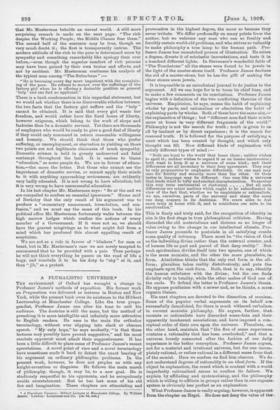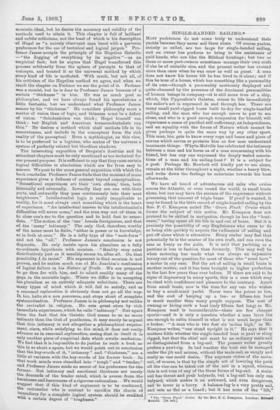A PLURALISTIC UNIVERSE.*
THE environment of Oxford has wrought a change in Professor James's methods of exposition. His former work on Pragmatism was delivered as lectures in. Boston and New York, while the present book owes its existence to the Hibbert Lectureship at Manchester College. Like the true propa.- gandist, Professor James can alter his tone to suit his audience. The doctrine is still the same, but the method of preaching it is more intelligible and infinitely more attractive to English readers. He uses in the main the orthodox terminology, 'without ever slipping into slack or obscure speech. " My only hope," he says modestly, "is that these lectures may possibly have proved suggestive," and his most resolute opponent must admit their suggestiveness. It has been a little difficult to place some of Professor James's recent speculations. A novel point of view and a novel terminology have sometimes made it hard to detect the exact bearing of his argument on ordinary philosophic problems. In the present work, however, he does not perplex us with any knight-errantism or disguises. He follows the main march of philosophy, though, it may be, to a new goal. He is studiously respectful to his opponents, and he scrupulously avoids overstatement. But he has lost none of his old fire and imagination. These chapters are stimulating and * A Pluralistic rhrtuerse ; Fliblart Lectures at Marselseeter College. 137 William James, London ; Longman. and Co. [6eo Ocli net.] provocative in the highest degree, the more so because they' never irritate. We differ profoundly on many points from the author, but we welcome any man who can so freshly and forcibly restate world-old problems, and who strives so valiantly to make philosophy a true lamp to the human path. Pro- fessor James has unmatched powers of illustration. He seizes a dogma, divests it of scholastic incrustations, and tests it in a hundred different lights. In Stevenson's wonderful fable of "The Touchstone" all the stones were found to be jewels in the light of the master-stone itself. Professor James declinee the aid of a master-stone, but he has the gift of making the other stones seem jewels.
It is impossible in an untechnical journal to do justice to the argument. All we can hope for is to trace its chief lines, and. to make a few comments on its conclusions. Professor Janice begins with a definition of the two conflicting theories of the universe. Empiricism, he says, means the habit of explaining wholes by parts, and rationalism or absolutism the habit of explaining parts by wholes. Both of these have the same aim,— the explanation of things ; but "different men find their minds. more at home in very different fragments of the world." Philosophy is not the search for truth ; truth is given to us-
all by instinct or by direct experience ; it is the search for reasoned truth. It is followed for the purpose of satisfying a want which has been created by thought, and which only thought can fill. Now different kinds of explanation will satisfy different types of mind :—
"Both are loyal to the world that bears them ; neither wishes to spoil it ; neither wishes to regard it as an insane incoherence ; both want to keep it as a universe of some kind ; and their- differences are all secondary to their deep agreement. They may- be only propensities to emphasise differently. Or one man may care for finality and security more than the other. Or their tastes in language may be different. One may like a universe that lends itself to lofty and exalted characterisation. To another
this may seem sentimental or rhetorical But all such differences are minor matters which ought to be subordinated in view of the fact that, whether we be empiricists or rationalists, we are, ourselves, parts of the universe and share the same one deep concern in its destinies. We crave alike to feel more truly at home with it, and to contribute our mite to its. amelioration."
This is finely and truly said, for the recognition of identity ha aim is the first stage in true philosophical criticism. having' discarded the old materialisms and theisms as no longer of ' value owing to the change in our intellectual climate, Pro-- fessor James proceeds to postulate in all satisfying creeds some quality of intimacy. There must be "the vision of God as the indwelling divine rather than the external creator, and of human life as part and parcel of that deep reality." But such spiritualism divides itself into two species, one of which is the more monistic, and the other the more pluralistic, in form. Absolutism thinks that the only real form is the all.. form; pluralism takes reality distributively, and puts the emphasis upon the each-form. Both, that is to say, identify the human substance with the divine ; but the one finds- divinity only in totality, while the other makes of God one of' the cache. To defend the latter is Professor James's thesis. He opposes pantheism with a newer and, as he thinks, a more organic theism.
His next chapters are devoted to the dissection of monism.. Some of the popular verbal arguments on its behalf are successfully demolished, for there is much withered verbalism in current monistic philosophy. Ile argues, further, that.. monistsor rationalists have discarded sense-data and their apparently incoherent associations, and have imposed a ebn- ceptual order of their own upon the universe. Pluralists, on the other hand, maintain that "the flux of sense experience contains a rationality that has been overlooked," and that a universe loosely connected after the fashion of our daily experience is the better conception. Professor James argues, not for a material and irrational universe, but for one incom- pletely rational, or rather rational in a different sense from that of the monist. Here we confess we find him obscure. We do not understand degrees of rationality in an ideal form. If the object be explanation, the creed which is content with a world imperfectly rationalised seems to confess its failure. We explain by affiliating and systematising, and the philosophy which is willing to affiliate in groups rather than in one organic% system is obviously less perfect as an explanation.
What Professor James is really arguing, however, is apparent from the chapter on Hegel. He does not deny the value of the.
anonistio ideal, but he denies the accuracy and validity of the methods used to attain it. This chapter is full of brilliant and subtle criticisms, not the least of which is his description of Hegel as "a naively observant man beset with a perverse preference for the use of technical and logical jargon." Pro- fessor James accepts the principle of the Hegelian dialectic —" the dogging of everything by its negative "—as an 'empirical fact; but he argues that Hegel transferred this process arbitrarily from the sphere of percepts to that of concepts, and treated it as the universal method by which every kind of life is mediated. With much, but not all, of his criticism of the Hegelian method we agree, and when we reach the chapter on Feehner we see the point of it. Fechner was a monist, but he is dear to Professor James because of a certain " thickness " in him. Ho was as much poet as philosopher, and we have always found his speculations a little fantastic, but we understand what Professor James means by his "thickness." He considers philosophy more a matter of vision than of logic, and thinness must be a defect of vision. "Scholasticism ran thick ; Hegel himself ran thick ; but English and American transcendentalists run thin." He desires a method which shall mediate life in its 'concreteness, and include in the conceptual form the rich reality of the perceptual. Even a mythologist, on this view, is to be preferred to a logician, who makes of the universe a system of perfectly related but bloodless shadows.
The interesting exposition of Bergson's doctrine and its attendant chapters must be only mentioned as too technical for our present purpose. It is sufficient to say that they raise certain logical difficulties in absolutism which are far from easy to answer. We pass to the more general exposition with which the book concludes. Professor James finds that the moment of sense experience gives a fullness of content beyond conceptualism. 'Sensational experiences are their 'own others,' then, both internally and externally. Inwardly they are one with their parts, and outwardly they pass continuously into their next neighbours." Intellectualist logic is really inapplicable to reality, for it must always omit something which is the heart of experience. "An intellectual answer to the intellectualist's difficulties will never come," and the true way out of them is to close one's ear to the question and to hold fast to sense- data. "The notion of the 'one' breeds foreignness, and that of the 'many' intimacy." The only God, therefore, worthy of the name must be finite, "either in power or in knowledge, or in both at once." He is a lofty type of the " each-form " and not the "all." Professor James's conclusion is not -dogmatic. He only insists upon his pluralism as a fully co-ordinate hypothesis with monism. "Reality may exist distributively just as it sensibly seems to,, after all. On that possibility I do insist." His argument is that moniatn is not proven, and he makes much use of Mr. Joachim's confession
.of logical failure in his Nature of Truth. We are prepared
to go thus far with him, and to admit readily many of the gaps in the monistic logic. Where we differ is in accepting his pluralism as an entirely adequate substitute. There are
many types of mind which it will fail to satisfy, and as a reasoned explanation it obviously does not go all the way.
It, too, halts at a non poesumus, and stops short of complete systematisation. Professor James is in philosophy not unlike the revivalist in religion. He sets great store by rich,
immediate experiences, which he calls "intimacy." But apart from the fact that his theistic God seems to us no more intimate than the God of pantheism, it may surely be argued
that this intimacy is not altogether a philosophical. Tequire- ment, since, while satisfying to the mind, it does not really advance us in reasoned explanation, seeing that in itself it is
only another piece of empirical data which awaits mediation. We feel that it is impossible to do justice to such a book as this in so short a space, but we would point out in conclusion that the key-words of it" intimacy" and "thickness," are a little at variance with the key-words of his former book.- In • that work minds were classified into " tough " and "tender," and Professor James made no secret of his preference for the former. But intimacy and emotional thickness are surely the demands of the tender mind, which is averse from the harshness and barrenness of a rigorous rationalism. We would suggest that if this kind of argument is to be continued, the rationalist who is content to sacrifice the charm of unmediacy for a complete logical system should be credited With a certain degree of "toughness."











































 Previous page
Previous page